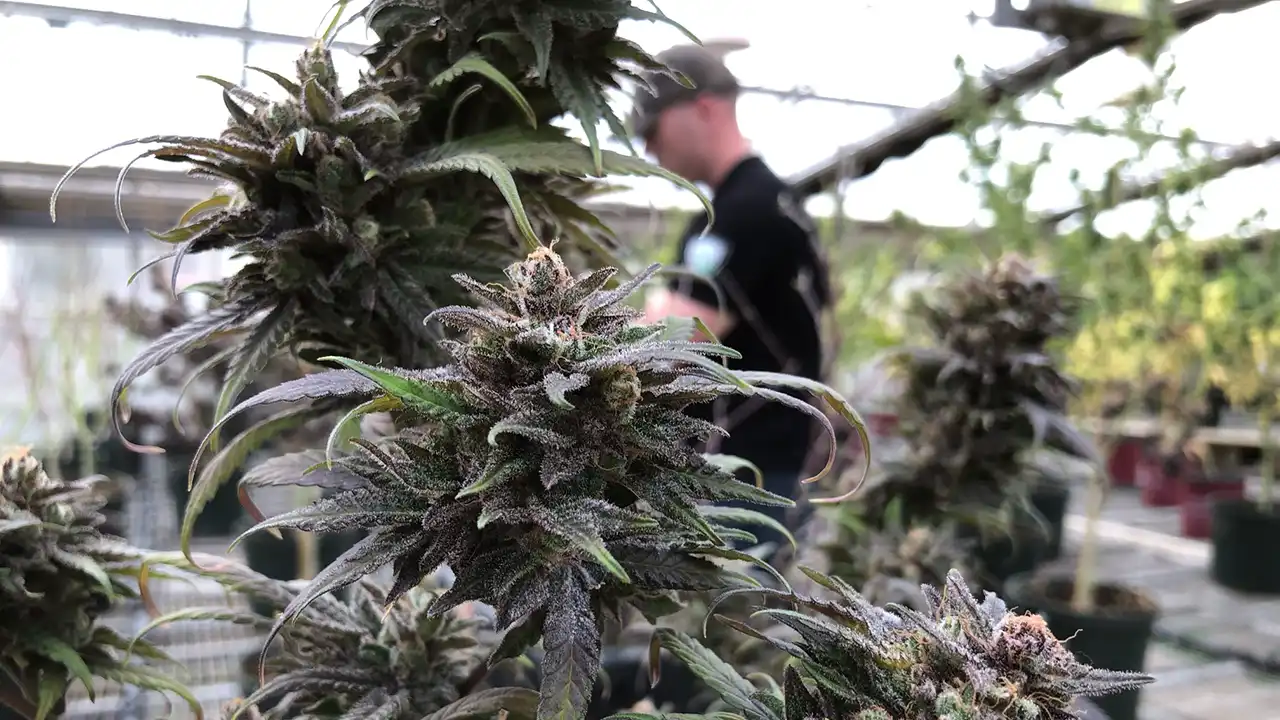After going to the major leagues, Joe Salome was planning to go to Trader Joes. That was before President Donald Trump signed the death warrant for his hemp business.
Now, instead of marketing THC beverages to a major grocery chain, Salome, founder and a managing partner of The Georgia Hemp Co., plans to procure and sell as much product as he can before the whole enterprise is outlawed in less than a year.
Before last week, “We were ready to launch into beverages,” said Salome, who last year threw out the first pitch at an Atlanta Braves game – the kind of privilege you get when your company is also a Major League Baseball team’s official CBD partner.
With distribution channels available in Georgia, expansion out of The Georgia Hemp Co.’s five retail locations and into big retailers seemed possible. That’s all on hold after Salome and thousands of other operators in the estimated $28.3 billion national hemp industry are due to become federally illegal in November 2026, when a federal redefinition of hemp becomes law.
In a limited way, “We’ve been through this before,” Salome told MJBizDaily in a recent interview. When Georgia outlawed THCA flower last year as part of a hemp regulatory bill, “we lost half our business,” he said Friday. But there was a bright side. “It still gave us the workable framework we’d been screaming to have,” he said.
This time around, the situation is worse.
But for now, Salome will prepare for the end by continuing business as usual. And as of now, he’s not alone.
Hemp THC beverage makers hope for carveout
Federal regulators are expected to issue more guidance within the next three months. The U.S. Food and Drug Administration is supposed to provide a list of cannabinoids that are allowed under the new rules.
And hemp advocates are working furiously to save the industry – and may have their first opportunity as soon as January, when another temporary spending bill will be needed as the one Trump signed into law expires.
But even then, major unanswered questions loom for the hemp sector.
Chief among them are:
- Who will enforce the federal ban on hemp THC products?
- Will states with regulated hemp industries (like Georgia) allow THC sales to continue?
- And will authorities make a distinction between some products as acceptable and others as verboten?
On the last point, Jake Bullock, the CEO of low-dose hemp-based THC beverage company Cann, is making a bet.
But first, he’d like to make a correction.
“For us, this is not a ban,” he told MJBizDaily. “This is a one-year shot clock to get the rules we wanted.”
“When Congress bans things, they don’t give out a year’s warning,” he added.
“This was an intentional win to get the good actors in the space to go get the rules they need.”
Based on his experiences lobbying Congress with the Coalition for Adult Beverage Alternatives, a recently formed advocacy group for low-dose THC drinks, Bullock is confident that those rules are achievable – and will specifically allow hemp beverages, while keeping superpowered gummies and THCA flower illegal.
“We have good indications from lawmakers” on that front, he said.
For that reason, like Salome and Georgia Hemp, Cann is also “business as usual,” said Bullock, but with the expectation that business will continue after November 2026 instead of finishing with a flourish.
Based on initial talks with wholesalers and retailers, “we probably have six months” of normalcy, he added. “If nothing changes in six months, by July 4, that’s when we’ll have to start making adjustments.”
THCA merchants vs. CBD retailers: Outcomes will vary
The differences in the two companies’ preparation illustrates a broader point for hemp companies wondering how to approach 2026 with the ban looming.
Planning appropriately “depends on what types of hemp businesses we are talking about,” said Vince Sliwoski, the Portland, Oregon-based managing partner of Harris Sliwoski, a cannabis-focused law firm.
Some firms could pivot to products that will be allowed, such as CBD or whatever the FDA allows.
Procuring source material could still be challenging, as some critics claim that limiting all plants to no more than 0.3% THC by dry weight outlaws most hemp plants. And many CBD-rich preparations might prove to contain more than the 0.4 milligrams of THC allowed per container.
Operators in states with regulated hemp industries who are in compliance with the law may “have better prospects than people like online THCA merchants,” Sliwoski added. (As Salome’s experience in Georgia shows, lawmakers seem aware that “THCA flower” is just marijuana flower – and belongs in regulated channels.)
At the same time, the federal bill could encourage states to tighten existing hemp rules or finally ban hemp-derived delta-8 and delta-9 outright as Illinois Gov. JB Pritzker recently signaled.
“We’ll likely see a renewed effort to outright ban intoxicating hemp products in that state and elsewhere,” Sliwoski said.
Subscribe to the MJBiz Factbook
Exclusive industry data and analysis to help you make informed business decisions and avoid costly missteps. All the facts, none of the hype.
What you will get:
- Monthly and quarterly updates, with new data & insights
- Financial forecasts + capital investment trends
- State-by-state guide to regulations, taxes & market opportunities
- Annual survey of cannabis businesses
- Consumer insights
- And more!
Some hemp companies will ‘let it ride’ ahead of ban deadline
The yearlong grace period gives hemp operators time to plan and time to pivot – with the real possibility that they’ll then pivot again, depending on what their state, the FDA or whatever enforcement that appears chooses to do.
“We can expect some dynamism in the year ahead, so many may choose to just ‘let it ride’ into Q2 or Q3 next year, and see what unfolds.” Sliwoski said.
That’s more or less Salome’s philosophy. And he also knew this was a possibility – and prepared for it.
Many of The Georgia Hemp Co.’s leases and contracts include a clause allowing for sudden changes or to leave entirely based on a regulatory change. That might not satisfy bank loans, which raises the specter of bankruptcy (and whether that’s something hemp companies will still be able to pursue).
That’s an outcome Salome will worry about later.
“I think the mentality is to procure as much inventory as possible and continue to sell and provide, whether for my employes or our customers,” he said, before striking an optimist’s note.
“At the end of the day, industries will always survive, even if brands don’t.”
Chris Roberts can be reached at chris.roberts@mjbizdaily.com.
Medical Disclaimer:
The information provided in these blog posts is intended for general informational and educational purposes only. It is not a substitute for professional medical advice, diagnosis, or treatment. Always seek the advice of your physician or other qualified healthcare provider with any questions you may have regarding a medical condition. The use of any information provided in these blog posts is solely at your own risk. The authors and the website do not recommend or endorse any specific products, treatments, or procedures mentioned. Reliance on any information in these blog posts is solely at your own discretion.






